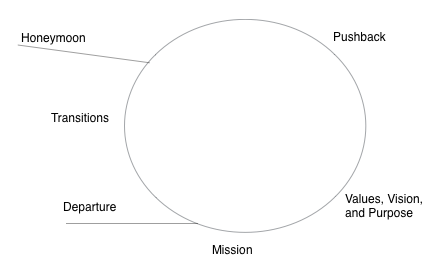 It's surreal sitting in a Starbucks after my third week as a pastor. I'm so grateful to the wonderful folks at Emmanuel Baptist for their kindness, hospitality, and genuine enthusiasm for charting a new course in our journey of being faithful to Christ's call to make disciples. It's been exhausting, busy, challenging, and when you throw in being 14 hours away from Carrie and the boys, it's been somewhat lonely too. I'd say there's 7 big lessons I've learned about ministry in such a short time. 1. Listening > Talking - So many times we assume our ministry activity happens when we're preaching, teaching, praying, and discipling. In essence, the times our mouth is moving. And those are all extremely important things to do, but sometimes the best thing we can do is keep our trap shut and hear someone share their story. 2. Trust and Delegate - It's really hard to have hands-on leadership in every little detail, and pastors who do that tend to err on being micromanagers or control freaks. Because there are so many issues that need to be addressed, I've learned how important it is to delegate responsibilities and not be involved in every minute detail. With that delegation comes trust, when I have to let go of my authority to handle something, but still bear responsibility for it. That's tough. But if we don't do that, we're not living out Ephesians 4 to equip the saints for the work of ministry. 3. Proactive Scheduling - Time is a leader's most valuable, and nonrenewable, resource. Taking control of time and proactively scheduling is the only way to manage the numerous responsibilities (see #2) while maintaining priority. My iCal looks like a coloring book, but it's the only way to be in control of time, and not let time control me. 4. Sunday Sneaks Up - It's felt like once I had the week under control, I wake up and it's Sunday and back around we go! I know every pastor has a different style and practice, but I love working ahead on sermon preparation, and I've found that's been a great way to be ready for when Sunday (inevitably) rolls around. Everyone has a different time frame, but if you can stay 4-6 weeks ahead on message preparation you'll find a cushion for when Sunday gets there much quicker! 5. People Aren't Projects or Interruptions - Speaking of #3... I was leaving in a hurry to go to a meeting across town when someone met me in the parking lot with "Hey pastor, do you have a minute?" One of the hardest lessons I've learned in ministry is that people aren't problems to be fixed or interruptions to be managed, they're people who God loves and who you love too. Seeing those as "God Moments" rather than interruptions changes everything. John Maxwell talked about it as "walking slowly down the halls" in 360 Leader, and there's so much truth to that imagery. 6. Time Away is Essential - God created a work/rest rhythm in Genesis 1 not because He needed it, but because we do. If you're a ministry leader and you're hitting the grind without any time off in a long while, you need to stop what you're doing and get some rest before it kills you or your ministry. I love being 25 minutes from the beach, and taking some time away to rest and hear the ocean waves has been exactly what my soul and body have needed. 7. Family is Priority #1 - I love our new church. I'm so excited about what God could be doing in our midst in the next few years and beyond. But the reality is they can find another pastor if I leave. The other reality is that Carrie cannot have another husband, and Sam & Gray cannot have another daddy. One thing I think that contributes to pastoral burnout is the imbalance between work and home, either they spend too much time at work and flame out at home, or they spend too much time at home and not enough at work and they fail to meet expectations. Have trusted people around you who can hold you accountable to keeping that balance strong. And boys, when you and mommy get here in a few days, we're gonna have fun at the beach!
2 Comments
One of the things I love about living in Kentucky is how distinct every season is. And as a bonus, sometimes we can get all four in a week! But each season has its own feel, its own qualities, and its own challenges. Leaders travel through different seasons in their journey--each has its own qualities and responses. And like the calendar, leadership seasons are cyclical. Here's my best shot at how the seasons flow.  The Honeymoon season of leadership is where a new leader enters the scene and everything is exciting, new, fresh, and optimistic. If you come into a dire situation, you are viewed as a source of hope. If you come into a healthy situation, you are viewed as the successor to continue pressing on. In ministry, this is the equivalent of the "Freshman 15" for college students. Be ready for a lot of casseroles, baked goods, and people wanting to have lunch with you. The emphasis in this stage should be adjusting your family, developing relationships, and spending time talking and listening to folks. The Pushback season of leadership is when the honeymoon ends. You had this too in your marriage. This was that first fight after settling into your apartment. Our first pushback was over how to sort laundry. Sounds silly, but your first argument with your spouse probably was too. In leadership, pushback happens when you make a change or when they find out you're not Superman. It's not wrong or bad, it's reality. None of us can ever live up to the expectations or imagination of what people think a leader should be. Or pushback can come when a leader feels impressed to make a change of something that has "always been done this way." It's important for a leader to remember to that any change initiative should be done slowly, with others on board, and with careful calculation of the cost and impact on your strategy. Changing something because you don't like it is dumb. Changing something because it doesn't advance the mission or connect people to Jesus is worth exploring. But no matter how small or insignificant you think something is, it likely means something to someone. So be ready for the pushback season. How you handle this is important. Will you listen to people or will you surround yourself with yes men? Will you communicate clearly your heart and intent? Will you build a coalition of other leaders or will you go out on the ledge with a chainsaw alone? The hopeful next season after pushback is what I'll call "Values, Vision, and Purpose." This is the season where who you are starts to shape who the church is, and what's important starts to rise to the top. Maybe you've got a dream of what you want things to look like down the road? When you share that and craft that, and ultimately write it down, you're capturing a vision. When you write down your values, you're laying out what's most important to you as a church, and what you will shape your priorities, budget, programming, and emphases around. And when you lay out purpose, you are laying out why and for whom you're working. These are huge, because now you're in the season of creating new norms, of cultivating a culture, and beginning the process of transformation. Like working outside during August, this season is hard work. It requires a leader to be proactive, to be relational, and to keep the endgame in mind. It's a huge task, but effective leaders are able to wear multiple hats. The next season is Mission. This is where things click, where what's been laid out as important is now put into practice. Maybe one of your values is building strong families. At the mission season, you're developing effective next generation ministries, hosting marriage seminars, and preaching regularly on the importance of the home and family for faith formation. If you're into Tuckman's Group Stages, this is similar to the "Performing" stage. Because you've laid out a vision of where things could be, you've given people a goal to chase. Because values have been normed, there's focus on what's important. And since you've laid out purpose, people are willing to serve and take on new projects and ministries because they see the One they're serving. The last season in the cycle is Transitions. Every church is both organization and organism. People come and go, jobs will take key leaders away, funerals will mark the end of a faithful legacy of people you counted on, and new people will be moving from attender to member to minister. Along with that, healthy organizations occasionally need to go through a process of evaluation and modification. Maybe there's a ministry that once was effective but has gone past its time, or a staff member gets a shift in their job description to match a new sense of calling. These things are normal, healthy, and good. But they require transitions. A transition is different than a change. In a change, things get shuffled and flipped. But in a transition, there's an intentional effort to honor what's been done, identify who can step into the gap, and turn the page to a new chapter. So cheer on the deacon who took a new job across the country, cry with their family, and let them finish well. Then, fill the gap with another qualified leader. Because the Transition season marks a whole shift in the leader's emphasis, we renew the cycle. So after a leader goes through Transitions, they'll go through Pushback as new leaders and new processes start to take shape which are different than what had been done before. And from there it moves to the Values, Vision and Purpose, then to Mission, and again back to Transitions. What's also worth mentioning is that like Kentucky where the seasons change daily sometimes, there is some fluidity in the Pushback, Values Vision & Purpose, and Mission seasons. Sometimes you'll float back and forth between those, and that's where a leader's flexibility and adaptivity is important (for more on this, check out Situational Leadership). The season that hasn't been mentioned is the Departure season. In this, a leader is the one making the transition. But it takes a tangent off the cycle because it impacts things much differently. And in the Departure season, the church takes the initiative to make sure that the leader is able to leave well and move off the cycle. In my book Dream Teams, I talk about the importance of leaving well. It's important for a leader to make sure they are setting up the church to continue on without them, and for the church to make sure the hard work and legacy of the leader is celebrated (but not idolized). Because a Departure season naturally means a significant transition, I took it off the cycle, it's inevitable that a Departure season is going to be a "lame duck" in a lot of ways. It's hard to get behind new initiatives because the next leader will bring a different set of ideas, gifts, and personality.  This month back in 2007 I drove to Memphis to meet with a church that I'd been talking with for a few weeks. During that weekend I met with church leadership, the student ministry, and got a lay of the land. It all capped with a "trial sermon" where I shared my vision and dream for the student ministry. I was 25, inexperienced, and really hoping things went well (this was the position I'd prayed for so Carrie and I could finally live in the same city!) to start a new chapter in God's work in my life. Reflecting back on that 8 years later, there's so much I wish I could tell young dumb 25 year old me what 33 year old slightly-graying me has learned over the years. These 7 suggestions are more than that, I really believe these are helpful for anyone getting a start in student ministry. Hold tightly your convictions, loosely your methods - Your convictions are your deeply held beliefs that ground the philosophy of your ministry. Stick to those, because they are your rudder to keep your ministry going towards what God has called you to. For our student ministry, they have shaped our core values: We teach the Bible systematically, we raise leaders, we develop a culture of missions, and we build Gospel-focused relationships. Methods are how you get to your convictions, and those change. I think student ministry has an 18-month shelf life on methods. What worked 10 years ago probably won't work now. I saw that play out on a college campus, where free food wasn't enough to draw a crowd. I remember commenting that in 2000 when I was a college freshman you could've gotten me to show up to anything with food. Always evaluate the effectiveness of your methods. And don't love them enough that you keep doing the same thing and expect different results. Be open to change, and don't be scared to revise and change what you're doing--so long as your end game is the same. Be comfortable saying no - I wrote on this earlier. You can't do everything, be everywhere, or try everything. You have to know the difference between what's good and what's great, and be willing to say no to the good so you can say yes to the great. One pastor I served under said after his retirement "I wish I'd done less so I could have accomplished more." It also matters how you calendar and plan things, which is an important step in learning the difference between good and great. Pick your battles - Not everything is worth stirring up a stink for. Sometimes you have to let things slide and let time work its problems out. I have a few things I'll fight for: sound theology, purity, and missions. When The Shack came out, I came out strongly opposed to it because of its heretical portrayal of God. I remember the disappointment and some anger when I announced we'd no longer use NOOMA videos in our student ministry. Those were worth fighting over because there were major doctrinal elements involved. It's not always worth it though. I almost got fired for making a statement against teenage dating. Probably not worth fighting over in hindsight. So choose wisely, and lean on your parents, volunteers, and pastor for wisdom to know what's worth it and what's not. Be the champion for parents - "Mom and dad say I shouldn't listen to this CD, what do you think?" I remember that question clearly, and I remember my response as clear "As long as you live under their roof and they're paying your bills, do what they say. I'm not ever going to go against your parents, unless they want you sacrificing cats or something." Parents, especially of teenagers, do not have an easy job. You were a teenager once, remember all you put your parents through? Build a library of resources and communicate that to them regularly (I use our email newsletter to send links to articles on marriage, parenting, technology, trends, etc.), pray for them, and give them encouragement or affirmation. Support your pastor - Your pastor is dealing with stuff you can't even imagine. When you're over every ministry area, there's no one else to pass the buck to. Chances are he's fighting discouragement, he's stressed, and he's feeling overwhelmed. Make it a point to pray for him on a regular basis, and occasionally with him. Be his champion to critics. Don't even entertain gossip or dissension. And if you hear it, rebuke it. It won't be fun, but your pastor needs it. Be available to make hospital visits and the other daily activity in ministry. I did my doctoral work on the pastor/associate dynamic, and the healthiest and most effective leadership teams were the ones that had a solid foundation with the pastor. Keep reading - Finishing seminary isn't an excuse to quit reading. You need to keep yourself in the literature, attend professional growth experiences, and network. Find out what other student pastors and church leaders are reading, and keep sharpening your mind and heart to be a more effective pastor. Revisit the books you once read that really shaped you (Desiring God and Knowing God are two of mine), and ask your church if they would pay for you to subscribe to journals/magazines on student ministry (Youth Worker Journal is a great one). Remember to keep your family first - I'm going to be blunt. You're not that important to your church, your students, or your ministry calendar. You are that important to your spouse and kids. The church can always find another student minister, but your kids can't find another mom/dad, and your spouse can't replace you. Don't sacrifice your family on the altar of ministry. Two things I've learned to do on this are 1) Let my wife take the last look at the quarterly schedule, 2) Involve my boys in student ministry activities. I want my wife to see the schedule to catch any blind spots, over-extensions, or to catch any dates we may be double booked! And I want my boys involved because I want them to love ministry and see why Daddy does what he does--to tell the "Big Kids" about Jesus. Long ago a friend dared me to run a 5K. I agreed to it when I found out there'd be treats at the end, of the Krispy Kreme doughnut variety. I got to the starting line and found a not-so-crowded spot, at the very front. I didn't know the front was for people who, you know, are in shape and have better goals than to "finish without passing out." The gun sounded and we all took off. And for that first quarter mile I was feeling great, flying with the best runners. Then one passed me, then another, then a few more, then lots more. And sometime around 1/3 mile I started questioning the goodness of life. Thankfully I did finish the race, and I got my doughnuts. And I learned two valuable lessons: 1) Be in shape before running a race, and 2) It's important to start slow.
When ministry leaders find themselves on the starting line of a new assignment, it can be very easy to buy into the hype and the excitement of the moment and start with a sprint, making changes and pushing the limit of what's possible. The problem with that is the same thing happens like in my race: you burn out, wear out, and end up struggling to the finish line. I believe good starts in ministry are important, so important I'm writing a book about how to get off to a good start. And getting off to a good start begins in those first steps off the line. As a leader you can choose to take off and sprint, to make drastic changes, to redefine leadership roles, and aggressively push in a new culture. Or, you can choose to step off the line with a slow, steady pace, gathering momentum and building on the previous miles so that you reach the finish line effectively. I believe starting slow involves listening, relationships, learning, and building. Listen to as many stories as you can - When you come into a new assignment, you're the new guy. So you need to listen to as many people as you can. Your fellow staff members, volunteers, and others in the community know more about your church and ministry than you do. By hearing their stories and how God has used them, you can get a sense of what's been done before you got there. When I arrived at my current assignment, I sat down with all of our volunteers to let them talk. The only thing I wouldn't let the conversation move to was my predecessor who'd been let go. But I just let them talk, about their family, their ministry, how God had used them, what they were doing, etc. Cultivate relationships - A pastor I know made a really significant change in his church and I asked how he had been able to do that, and his answer has stuck with me: "I ate a lot of pie." This pastor knew that the key to leading effectively was through relationship capital. After arriving, develop relationships as much as possible. Three levels of relationships church leaders will have are their volunteer team, their fellow staff, and other church leadership. It's important to develop relationships with those you'll spend time with. In our good intentions we want to develop relationships with every person in the pews, but the reality is that's an almost impossible proposition, especially in the first year or two. Those relationships happen over many years of crisis, life change, and a few potluck meals. Learn your culture - Every church has its own unique culture, what the values are, who the key people are, what their history is, what their "style" is, and what landmines are out there. My first ever ministry assignment was a part-time youth minister. Early on I made a big change to what we would be doing for our summer missions. Little did I know that the church had done the same mission project for decades and it was something way bigger than a week on the summer calendar. I didn't take the time to learn the culture, and it cost me. As part of listening and cultivating relationships, find out more from those who've been at your church longer what the culture is. Chances are you'll have a "church historian" in your circle who can help you understand the landscape. Scouting well gives you the ability to navigate any potential issues, and gives you the perspective necessary to lovingly lead people towards your vision. Build a vision coalition - This isn't a line in the sand of Us vs. Them, it's the culmination of listening, relationships, and learning--you're starting the process of leading the church or your ministry towards a vision you believe God has for them. After a year or so, I remember sitting down with my volunteer team and asking them vision questions. It was time to start working towards transforming the culture, and I knew accomplishing that would happen through these volunteers. So we started asking questions of why and how. And we started praying towards what we wanted students to be, know, and do when they graduated from our student ministry. As a leader, this coalition becomes an incredible resource for you. They can help you with the timing, the process, and ultimately the worship element of the vision--your goal as a leader is to help people love Jesus more and serve Him on mission daily. Those of you in ministry, what did you do early on to start off well? What lessons did you have to learn the hard way? |
Scott M. DouglasA blog about leadership and the lasting legacy of family ministry. Archives
August 2023
Categories
All
|

 RSS Feed
RSS Feed



